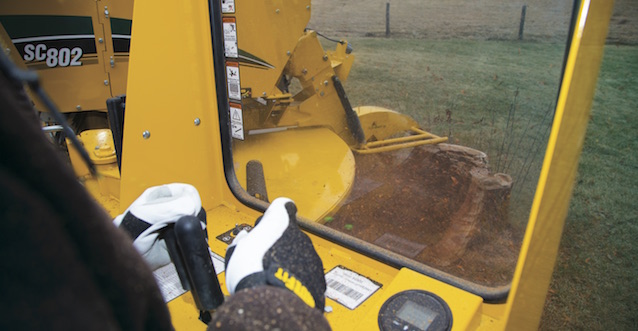An important part of buying used equipment is evaluating who you are buying from.
Here are the pros and cons of three sources of pre-owned equipment: dealerships, contractors and auctions.
RELATED: TIPS FOR WHEN YOU’RE CONSIDERING USED EQUIPMENT
Dealerships
Dealerships offer many advantages when it comes to used equipment. First, a reputable dealer will usually have no problem letting a contractor demo a piece, something that’s not always true with other sellers.
“We’ll let them go out and demo a machine so they can make sure it is as advertised,” says Chad Van Soelen, general manager at the Vermeer Midwest dealership. “We keep a stack of wood here so someone can run it through a brush chipper or a horizontal or tub grinder.”
Another benefit of dealerships is the good ones can offer support after the sale with service and parts. Many dealers have in-house technicians who are experts with the equipment their location offers.
One potential downside with dealers is they don’t always have as large a selection of pre-owned machines as somewhere like an auction. But if they are part of a dealer network, they may be able to source a piece of equipment from another location.
RELATED: FIND A VERMEER DEALER NEAR YOU
Contractors
Buying directly from a contractor means you should be dealing with someone who understands your industry and has intimate knowledge of the history of the machine you’re interested in. Those are both good things. The question, however, is how forthcoming they are with information about that machine, especially if it’s negative.
Also, owners sometimes have an emotional attachment to their equipment, just like with a “for sale by owner” home or a car, which may drive up their asking price.
Many contractors are turning to websites like Craigslist and eBay to buy and sell used equipment. When those deals occur over long distances, an interested buyer may have to either take a trip to see the item for sale or else evaluate it based on photographs chosen by the seller.
Auctions
The biggest advantage of auctions is they tend to have a large selection of equipment.
At the same time, buyers can run into some of the same issues they do with buying directly from an owner. For instance, as more and more online auction sites proliferate, there’s the same question of evaluating equipment through a photograph or video. At in-person auctions, a potential buyer usually can inspect the equipment, but they may not be able to demo it.
Van Soelen says Vermeer Midwest has lots of experience with repairing equipment someone got at an auction.
“They may save money on the initial price, but a lot of times, they could end up putting more money in it in repairs because it came from an auction where it wasn’t checked out as extensively as it should have been,” he says.
Also, similar to purchasing directly from an owner, emotions can play a role at auctions, but this time on the part of the buyer. “Auction fever” is a real term to describe the phenomenon of people bidding higher than they had planned at an auction. They may get caught up in the moment, or not want to “lose” to someone else, or as bids go up, question whether the price they thought an item was worth was correct.
